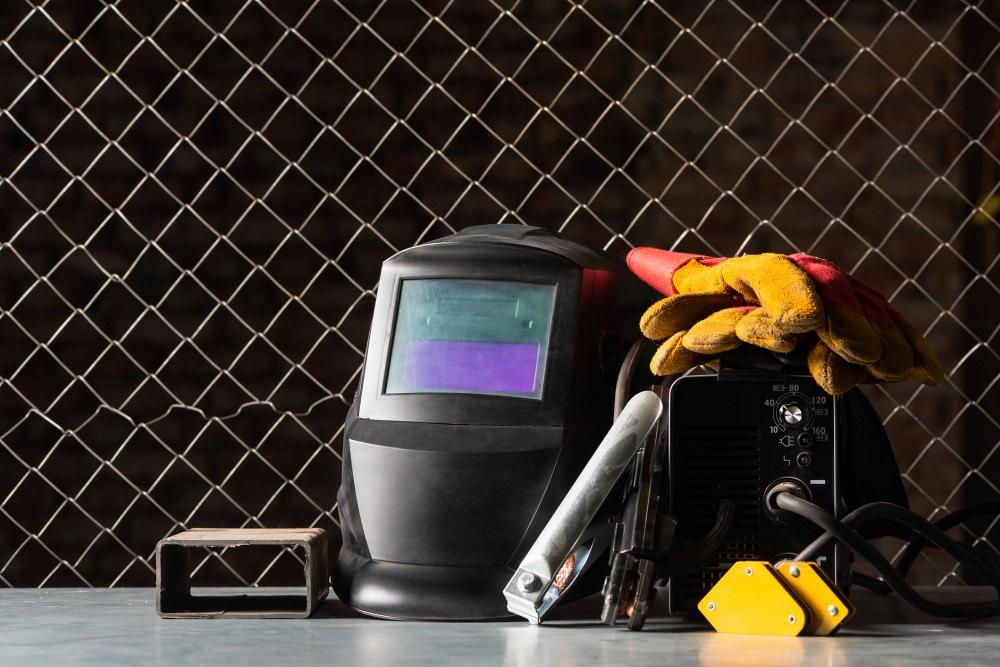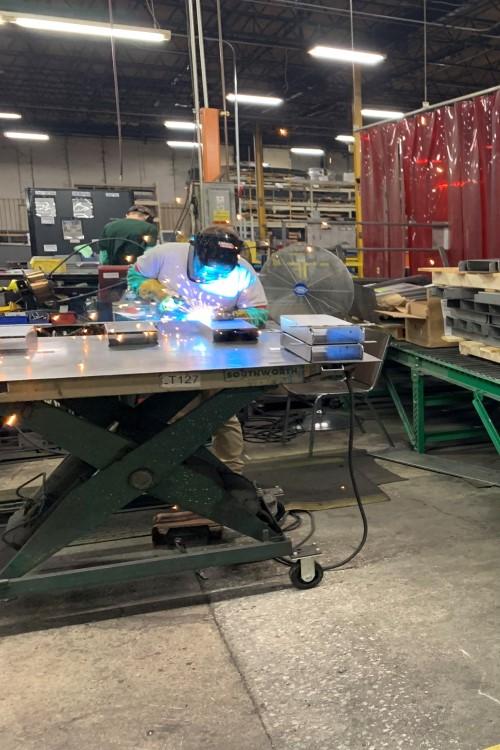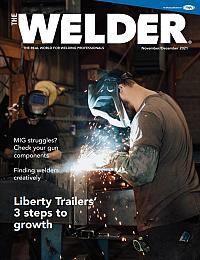- FMA
- The Fabricator
- FABTECH
- Canadian Metalworking
Categories
- Additive Manufacturing
- Aluminum Welding
- Arc Welding
- Assembly and Joining
- Automation and Robotics
- Bending and Forming
- Consumables
- Cutting and Weld Prep
- Electric Vehicles
- En Español
- Finishing
- Hydroforming
- Laser Cutting
- Laser Welding
- Machining
- Manufacturing Software
- Materials Handling
- Metals/Materials
- Oxyfuel Cutting
- Plasma Cutting
- Power Tools
- Punching and Other Holemaking
- Roll Forming
- Safety
- Sawing
- Shearing
- Shop Management
- Testing and Measuring
- Tube and Pipe Fabrication
- Tube and Pipe Production
- Waterjet Cutting
Industry Directory
Webcasts
Podcasts
FAB 40
Advertise
Subscribe
Account Login
Search
How to get a welding job with no experience
Omaha, Neb.-based manufacturer turns individuals with aptitude but no experience into welders
- By Amanda Carlson
- Updated April 7, 2023
- November 24, 2021
- Article
- Shop Management
When retail fixture manufacturer Lozier Corp. faced a critical need for welders, the company had two choices: Continue down the same path of traditional hiring practices or dare to think outside the box.
The Omaha, Neb.-based company chose the latter.
With five locations nationwide, the company employs roughly 2,000 people and manufactures checkout counters and self-checkout counters for grocery stores and major retailers, wire displays, and shelving units for stores and warehouses. Finding welders hadn’t been especially easy for the company pre-pandemic, but skyrocketing business over the last 18 months has made the welder shortfall even more glaring, said Hannah Bolte, Lozier’s corporate communications manager.
And they weren’t alone. All local manufacturing companies were in the same boat, which made for fierce competition for talent among employers. Lozier brass got together and decided if they couldn’t find existing welders, why not just train hardworking individuals with an aptitude for working with their hands to become welders?
The WELDER spoke with Bolte recently about the unconventional way Lozier handled its welder shortfall, whether it was successful, and takeaways from this out-of-the-box approach.
Take us through the job fair you held and what qualities you were looking for in those who attended.
With everyone hiring, we decided to get a little creative with how we recruited talent, specifically welders. We decided to have a welding hiring event at one of our plants back in July. We sought out certified welders but also those with no experience who wanted to learn. We were committed to teach those inexperienced individuals to be able to weld and to do it correctly and safely. The positions we were hiring for weren’t entry-level positions, so we had to find the right people who had a desire to learn but who also had an aptitude.
The way that we've done hiring events in the past that were not specific to welders is people would come in who had applied online. If they hadn't applied online, they had to apply using one of our computers or iPads that we had available. Then they would meet with a recruiter to talk about their background, why they were interested in the job. Then they’d take a plant tour because we feel it's really important for someone to see the conditions they would be working in before we’d extend an offer.
From there they might have another interview on the spot with a different recruiter or with one of the managers, and then potentially they’d receive a conditional job offer contingent on the results of a drug screen and background check.
We ran the welding hiring event very similarly. Everything happened on the spot during the three-hour event with the exception of a background check and drug screen. We had recruiters on hand looking for people that had the right attitude to learn and had the mechanical aptitude that would lend itself well to welding.

Hannah Bolte, corporate communications manager at Lozier, said the company’s decision to train inexperienced yet driven individuals with an aptitude for welding was a first, with results that have exceeded their expectations.
We also had managers that these individuals would work with every day to shed some light on what that day-to-day job would look like for them. For as much as we want to find the right people, we also want to make sure that they feel it's a good fit for them too. Most of the people that came to the job fair were of the mentality of always wanting to learn how to weld but never had the means or the time to do so.
How many people did you hire as a result of the job fair?
We ended up hiring 13 people at that event, and eight of them had no prior welding experience. The five with welding experience were put to work right away. The eight with no experience went through a two-week class at the community college.
What was the next step for the individuals with no welding experience?
We partnered with Metropolitan Community College here in Omaha. It’s not very far from our facilities and we've been partners with them for many years, sending existing employees from other departments there to learn how to weld. But this was the first time that we worked with the college to teach someone with the right attitude and an aptitude but no prior experience how to weld in a very short amount of time.
We worked with the college to create a very specific, condensed, and intense two-week curriculum. The people that we had hired who had no prior welding experience went to class at the college in the mornings from about 8 a.m. to noon.
The curriculum that they developed was specific to Lozier based on the work we do every day. They learned how to MIG weld and about safety protocols and procedures.
And then in the afternoons they came to our plant and got on-the-job training.
After two weeks, they took a test. If they passed, they were released to start working for us. Everyone who took the class passed the test and began working for Lozier full time.
It’s important to note that they were paid hourly to go to the class, and we covered the tuition and the fees that were associated with that class. They accrued zero debt. We've never done that before.
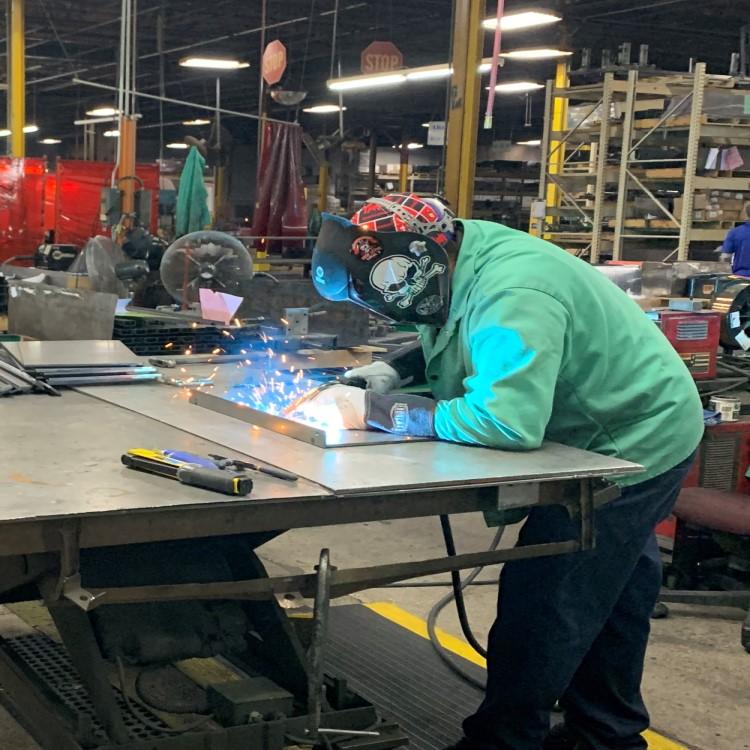
The job fair netted the hiring of 13 people, eight of whom had no prior welding experience. The five with welding experience were put to work right away. The eight with no experience went through a two-week class at the community college. In addition to covering the cost of the class, the company also paid these individuals an hourly wage during their two-week training.
Was there ever a concern that an employee would leave immediately after receiving job training?
I think it's easy to assume that there would be a concern of, you know, is this investment worth it? We've awarded a tuition reimbursement or tuition assistance before, and we've also put current production employees through classes to learn a skilled trade before. What we’ve found is that people become more loyal to you when you invest in them. To us, investing in our employees is totally worth it. And the folks that we have invested in are some of our best employees.
Are you pleased with the results, and have you gotten any feedback from the new welders on the job and the opportunities that they were given?
I was just in one of our plants earlier this week and I spoke with one of the individuals who was part of this hiring class. He's been on the job for about a month and a half now. Since finishing the class and being released to start working, he told me just how much the opportunity has changed his life. Before this he was packing potato chips in a factory and didn't really have a career trajectory. Now he does.
He said this is the most money he’s ever made and that he's finally able to learn a skill that he could never have done on his own. He and his family are now looking at buying a house.
From a business perspective, we are thrilled that we found a way to hire and train people to help us meet the surge in demand from our customers. But from a personal level, it's really awesome to be able to see how these jobs—these career paths—have impacted people’s lives in such a positive way. They were given an opportunity that otherwise probably wasn't in the cards for them, and they're doing great work for Lozier and it's helping their personal life. It's truly a win-win.
This is a first of its kind for Lozier and, from our knowledge, for the college too. We've never taken people off the street before and paid for them to go to class and covered all class expenses in addition to that.
It's just really an extraordinary time that we're in right now, but like I said, the skilled labor shortage existed long before the pandemic. The pandemic has just kind of amplified the problem. Our partnership with Metropolitan Community College is so strong. We are always looking for ways to leverage our partnership to develop our current employees or help aid in new ways or approaches to recruitment efforts.
About the Author

Amanda Carlson
2135 Point Blvd
Elgin, IL 60123
815-227-8260
Amanda Carlson was named as the editor for The WELDER in January 2017. She is responsible for coordinating and writing or editing all of the magazine’s editorial content. Before joining The WELDER, Amanda was a news editor for two years, coordinating and editing all product and industry news items for several publications and thefabricator.com.
About the Publication
subscribe now
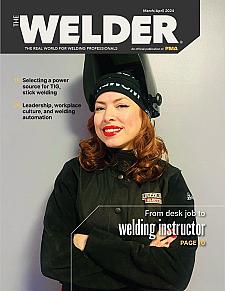
The Welder, formerly known as Practical Welding Today, is a showcase of the real people who make the products we use and work with every day. This magazine has served the welding community in North America well for more than 20 years.
start your free subscription- Stay connected from anywhere

Easily access valuable industry resources now with full access to the digital edition of The Fabricator.

Easily access valuable industry resources now with full access to the digital edition of The Welder.

Easily access valuable industry resources now with full access to the digital edition of The Tube and Pipe Journal.
- Podcasting
- Podcast:
- The Fabricator Podcast
- Published:
- 04/16/2024
- Running Time:
- 63:29
In this episode of The Fabricator Podcast, Caleb Chamberlain, co-founder and CEO of OSH Cut, discusses his company’s...
- Trending Articles
Sheffield Forgemasters makes global leap in welding technology
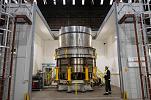
Welding student from Utah to represent the U.S. at WorldSkills 2024

Lincoln Electric announces executive appointments

Engine-driven welding machines include integrated air compressors

ESAB unveils Texas facility renovation

- Industry Events
16th Annual Safety Conference
- April 30 - May 1, 2024
- Elgin,
Pipe and Tube Conference
- May 21 - 22, 2024
- Omaha, NE
World-Class Roll Forming Workshop
- June 5 - 6, 2024
- Louisville, KY
Advanced Laser Application Workshop
- June 25 - 27, 2024
- Novi, MI
























